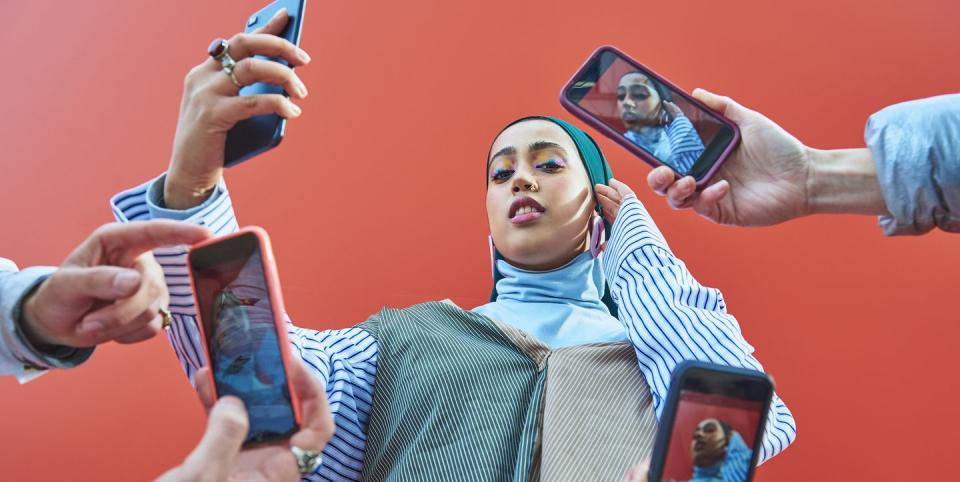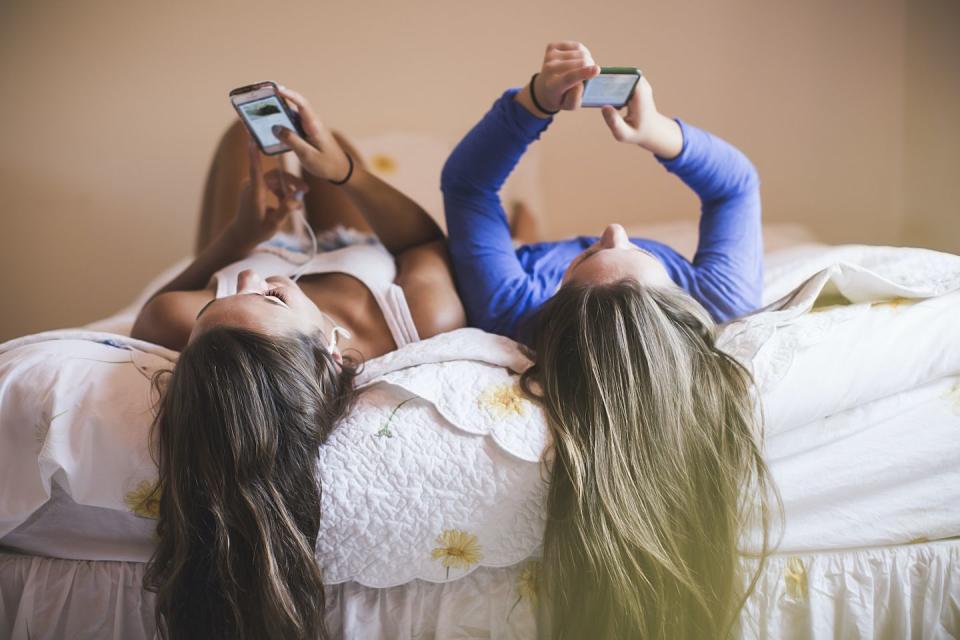Using Facebook to find your new BFF

“University was really hard for me as I didn't make any friends. I had to leave my student halls and move back home – I just didn't click with anyone living in my halls or on my course,” says 21-year-old student Ella.
When Ella moved back home, she discovered her hometown pals were meeting up without her, which was crushing. Wary of people’s intentions and keeping her guard up, she struggled to bond with people IRL. She got used to being alone.
“That was until I met Izzy"
Izzy and Ella don't have the most typical girl-meets-girl story. They met in a private Facebook group called Truly Twenties, which young women are using to find friends. From women who've just moved to a new city, to people who’ve drifted apart from their old friends and are looking for a new girl-group, friendships are flourishing in the world of private Facebook forums.
Without school, clubs, or being forced together with one of your mum's friends' kids, making friends as an adult can be hard. It’s much easier to invite the girl sitting next to you in maths, or the kid from karate class home for tea than the stranger sitting beside you in Starbucks. In general, young people are a surprisingly lonely bunch. A survey released in 2018 found 40% of people aged 16-24 felt lonely ‘very often’.
And the pandemic only exacerbated this, with a Harvard study showing young people were hit the hardest by loneliness during lockdowns. While making friends may not have been everyone’s top priority - considering the housing crisis and all the political unrest, to name a few - Facebook friendships flourished throughout the pandemic, and continue to now.
But apps like Bumble BFF, Friender and Peanut designed for forming friendships, why choose Facebook?
Who is even on Facebook anymore?
Basically, everyone. We mistakenly associate Facebook with our nans sharing cat memes they don’t understand and typing ‘lol’ to say ‘lots of love’. It’s apparent that Facebook is the least sexy of Mark Zuckerberg’s children. But with 2.85 billion active users, it remains the largest social media network in the world.
In fact, people under 35 are the biggest Facebook fans, with 25-34-year-olds making up 24.9% of Facebook's overall UK users and 20.7% being Gen-Z. Whether we’d admit it or not, we’re still loyal to Facebook. It’s like that one ex we all have, unsexy but dependable.
Why is Facebook having such a resurgence for finding female friendships?
Facebook still has one feature the sparkly new social media don’t include: groups. Whilst TikTok allows duets and Twitter delivers news in milliseconds, the ability to join a private group of like-minded users in a private forum - whether you’re an avid hiker, beauty fanatic or Kpop obsessive - has always been Facebook's thing.
Elle-Louise, founder of the Truly Twenties Facebook where Izzy and Ella met, says “Facebook is the most wholesome social media platform for me to be on. On other platforms, people engage. On Facebook, they actually connect.” Her Facebook group has amassed 17K members within less than a year.
The popularity of Facebook has blown her away. “I really didn’t think it would provide much for the brand [which aims to help people navigate being in their twenties] but people are making friends there! They're using Facebook to combat loneliness.”

While scrolling through Truly Twenties, Ella found a thread about pets, and posted a picture of her own dog, not thinking much of it. That was when Izzy messaged her “I think we could really bond over our dogs!”
And, they did. From there, they spoke every single day for eight months, finding they had more in common than just their pets. “It was nice to find someone who is like me,” says Ella.
Like Ella, 20-year-old student Oumy used Facebook groups to combat her loneliness. She longed for friends who were fangirls like her, so she joined a fangirl group when she was 13, where she could talk to others about her favourite artists. Oumy says being part of the Facebook group was a great thing for her: “friends IRL couldn’t understand my passion and I was scared to be judged by them. I needed to express my love for those artists and be with likeminded people.”
“When you feel down, you have people, friends that you can talk to and be super vulnerable with. You don’t have to see them the day after and feel awkward because you overshared," but it doesn’t come without doubts. "It’s scary to think that if you turned off your phone, this world would disappear.”
Whether you’re lonely because of Covid you’re not clicking with anyone at uni or you’ve outgrown your old friends, could Facebook be the answer to loneliness?
But can we actually turn these virtual friendships into IRL ones?
With Izzy living in Somerset and Ella from Worcester, they decided to meet IRL in Bristol for lunch and a shopping trip. “Initially I was nervous thinking would we get on in person like we do via messages,” says Ella. “But I knew she wouldn’t be a catfish at least, as we’d exchanged images and snapchat messages.”
They hit it off, and remain close friends ten months on. “I didn’t have to worry after all,” says Ella.
So, it’s possible to take these virtual relationships into the real world, just like you would with a Hinge match. But it’s always possible you could meet people who don’t pass the vibe check.

28-year-old marketing manager Faith joined a Facebook group to try to make friends more like her after her close-knit friends all started having children. She found a group of local girls and formed a WhatsApp chat. But, she knew they wouldn’t be besties. “Some have little boundaries, lashed out and reacted in difficult ways. One girl even asked us to pick her up at 3am when she was stranded, and we’d only been speaking for a short amount of time.” Faith told them they were being inappropriate, and their connection was soon over.
Just as you wouldn’t become best mates with everyone who shops in your local Tesco, the chances of becoming BFFs with someone you meet online are pretty slim. It requires a lot of work to transition successfully from virtual to real-life friends. That’s why Ella and Izzy are happy they let the friendship blossom online for so long before meeting.
It’s not all friendship forums
Cyberbullying, trolling and catfishing all critical concerns within the online world. According to antibullysoftware.com, 87% of reported online cyberbullying cases occurred on Facebook. Whilst the platform does have a reporting process, it’s still a prevalent issue.
Ellan, a 24-year-old psychology graduate tried using Facebook groups to make friends, but says being autistic has led to cruel comments online. “Usually, people use laughing reactions to my posts or comments. Sometimes they post horrible comments.” She was even removed from one Facebook group after being bullied.
In some groups, the admins and moderators are really good at catching these issues, but others are less so.
Many Facebook groups focus specifically on sensitive issues, aiming to provide a safe space for issues from eating disorders to OCD. While most people use these to connect with people in similar situations to them, 24-year-old dog grooming student Kelsey explains how sometimes this isn’t the case.
“Sometimes these groups can make you feel worse accidentally by offering reassurance for the anxiety, which if you have OCD, can actually cause more anxiety and heighten the condition.”
But overall, she still thinks Facebook groups are a great place to find support and friendships. You just can’t expect constant positivity. “Facebook has been great for finding helpful tools for mental health. Some people also make friends with them and form support bubbles.”
While it’s not all rainbows and butterflies on Facebook (we’ve all seen the darkness that pops up on the app from time to time), it could be a great place to find your best friendships. Join communities that interest you and scout around for anyone who shares similar experiences, join discussions, and ask or share some advice. But if you do connect with someone and want to meet in person, incredible! But do so safely, preferably with a group in a public space, and always tell someone where you’re off to.
You Might Also Like

 Yahoo Finance
Yahoo Finance 